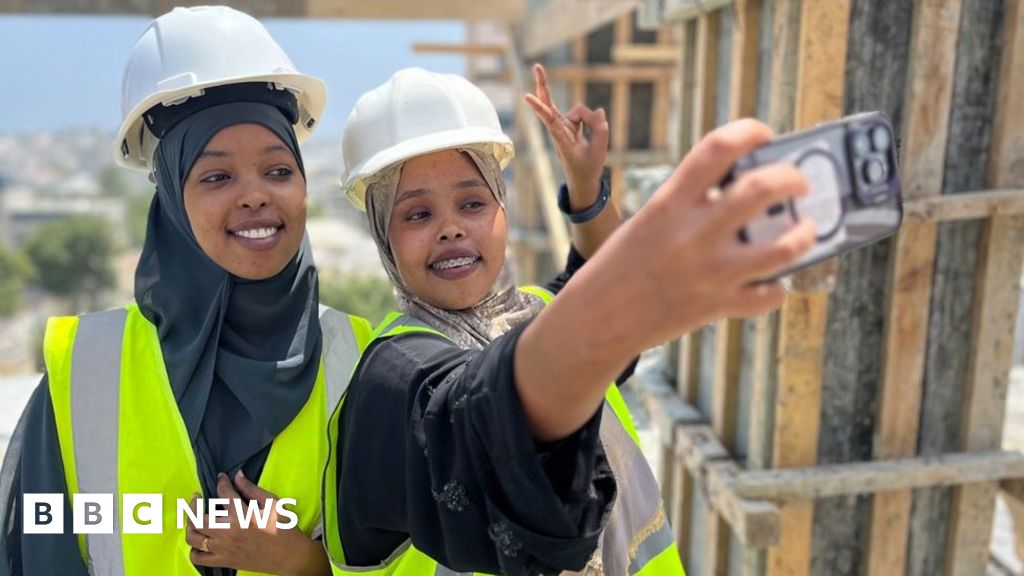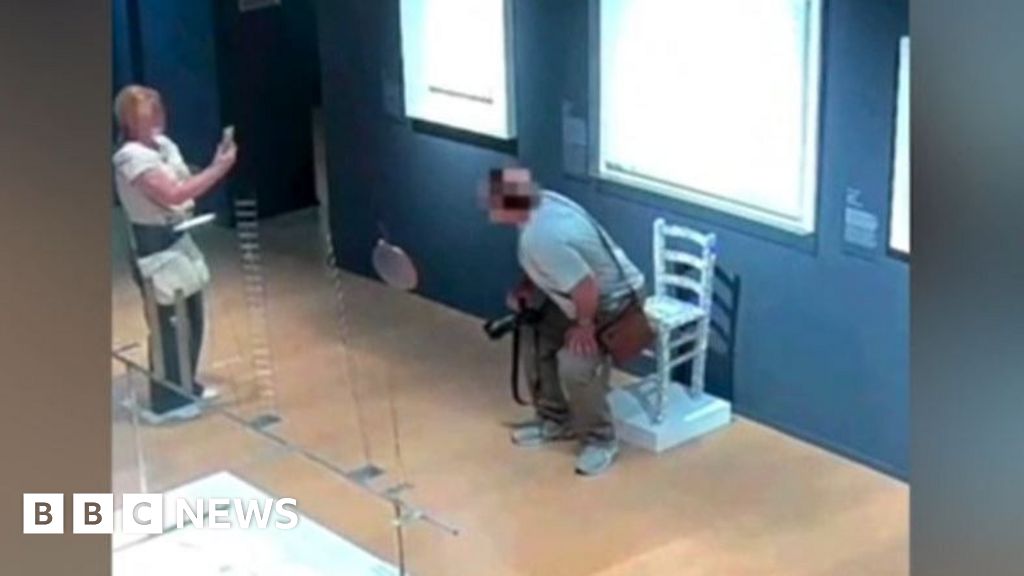ARTICLE AD BOX
Anwar Ali was allegedly killed by a Hindu mob in March 2019
As Uttar Pradesh, one of India's most polarised states, votes for a new government, the spotlight is on its 40 million Muslims. BBC Hindi's Kirti Dubey tracked the status of four cases involving hate crimes against Muslims during Chief Minister Yogi Adityanath's tenure.
"He used to carry a thin towel on his shoulder. They stuffed that in his mouth as they killed him," said Kamrun Ali, wiping away her tears.
Her husband, Anwar Ali, was allegedly killed by a Hindu mob in March 2019 when he tried to prevent them from destroying an Islamic religious structure near his house in Sonbhadra district.
Police arrested 18 people - all local Hindus, including some minors - over his death but they were granted bail within a few months.
Ms Ali said her family is still waiting for justice.
Lynchings and hate speech targeting Muslims have regularly made headlines since 2014, when Prime Minister Narendra Modi's Hindu nationalist Bharatiya Janata Party (BJP) swept to power.
Critics say the accused are often supporters of the party - and that anti-Muslim rhetoric by BJP leaders has emboldened them. The BJP denies the accusations, but its leaders rarely condemn such incidents.
Mr Modi himself was fiercely criticised for remaining silent for months after a 52-year-old Muslim man was lynched in 2015 in UP for allegedly storing beef in his home. The killing sent shock waves around the world but in the years since there have been several such attacks on Muslims.
Some of the worst incidents have happened in UP, where the BJP's Yogi Adityanath, a saffron-robed Hindu priest who has often made inflammatory speeches, became chief minister in 2017.
It's hard to say how many lynchings or hate crimes happen every year - in 2017, India's crime records bureau collected the data but did not publish it.
Image source, Getty Images
Image caption,Mr Adityanath has sparked many controversies with his divisive rhetoric
In the four cases examined by the BBC, victims' families alleged police apathy and said they were dissatisfied with the cases' progress. The accused are out on bail in three of the cases, while no one has been arrested yet in the fourth, more than seven months later.
Prashant Kumar, additional director general of law and order in the state, denied allegations of police indifference and inefficiency.
"The public has no right to beat anyone and if such incidents happen we take strict action against the accused," he said.
But Mohammed Asad Hayat, a criminal lawyer who represents victims of hate crimes, alleged that the police's reluctance to anger powerful people has weakened such investigations.
"Lynchings happen under a political agenda," he said.
Meanwhile victims' families say they are living in fear, and some have even fled their homes.
Distraught families
Anwar Ali's eldest son, Ain ul Haq, alleges that the arrival of local school teacher Ravindra Kharwar sparked communal tensions in their village, Parsoi.
"He encouraged young Hindu men to assemble and raise slogans against the Imam Chowk (where a religious structure stood)," he says.
Mr Haq says the group damaged it twice, but both times police intervened and negotiated its rebuilding.
But on 20 March 2019, according to the case registered by police, Ali caught a group destroying it a third time, and they turned on him. His son says they killed him.
Ali's post-mortem report says he died of wounds caused by a "sharp-edged weapon".
Kamrun Ali, Anwar Ali's wife, says they are still waiting for justice
The police investigation notes name Mr Kharwar as the main suspect. They raided his house but couldn't find him - he was marked as "absconding". Mr Kharwar denied allegations of his involvement.
When police filed charges, his name was missing. "We did not find any evidence against Ravindra Kharwar," the district's police superintendent Amarendra Singh said.
Mr Kharwar, a member of the Hindu nationalist Rashtriya Swayamsevak Sangh (RSS) - the ideological parent of the BJP - was transferred to a school in another village after Ali's death.
One of the main accused, Rajesh Kharwar, told the BBC that the school teacher used to tell them that Muslims are a threat to majority Hindus.
"We are in a deep mess and facing charges but he was saved," Rajesh, who is not related to the teacher, says.
But Mr Kharwar says he was at home during the murder and doesn't know the other accused.
Nearly three years on, Mr Haq said he is disappointed that all 18 accused are out on bail. It's unclear when the trial will begin.
The frustration is shared by Shahrukh Khan whose father, Sher Khan, was shot dead in June 2021 in Mathura district. Seven months later, there have been no arrests.
Mathura police superintendent Shrish Chandra said he was "not authorised" to explain why.
Police say the 50-year-old Khan was killed during a scuffle with "unknown" villagers while transporting cattle. But his son alleges that the killer was Chandrashekhar Baba, a religious guru who runs a cow shelter - Mr Chandrasekhar has denied this.
Shahrukh told the BBC he fainted when shrapnel from a bullet hit him during the fight. He says he woke up the next day at the police station, where he learnt of his father's death.
Shahrukh also alleges that he tried several times to add Mr Chandrashekhar's name to a police complaint but was dissuaded by police - an allegation Mr Chandra denies.
Sher Khan was shot dead while transporting cattle
Mr Chandrasekhar says he intervened in a fight between Khan and some villagers and sent injured people to hospital.
It's unclear what sparked the fight but buffalo meat sellers and cattle traders have been assaulted by Hindu vigilante groups who accuse them of transporting beef. While cow slaughter is illegal in several Indian states, including Uttar Pradesh, buffalos are exempt from the ban.
Police however arrested Shahrukh and five others for cattle smuggling on a complaint filed by Mr Chandrasekhar.
"I couldn't even attend my father's funeral because I was in jail," Shahrukh says.
"If they [the accused] believed that my husband was a cattle smuggler, then they should have handed him over to the police. Why did they open fire at him?" asks Sitara, Khan's wife.
Victims fearful, perpetrators free
In May last year, a viral video of a group of men beating a man in Moradabad district led to outrage online.
When the BBC visited the house of the victim, Shakir Qureshi, his mother started crying out of fear. She eventually allowed her son to speak.
Mr Qureshi, whose family has been selling meat for decades, says he was taking buffalo meat to a customer on his scooter when a group of men blocked his way and accused him of carrying beef.
"I wept and pleaded with them that I wasn't carrying beef, but they kept thrashing me.''
Shakir Qureshi was assaulted while taking buffalo meat to a customer
He says he was too scared to report the assault to the police - he only did so after the video went viral.
Police arrested six people, including Manoj Thakur, who was associated with a cow vigilante group. Mr Thakur spent two months in prison before he got bail.
Moradabad senior police superintendent Bablu Kumar didn't respond to questions about the status of the case.
But Mr Thakur admitted his role in the assault to the BBC - he said he wouldn't have been arrested if the video hadn't gone viral.
After the assault, Mr Qureshi stopped selling meat - he now works as a daily-wage labourer.
Fear and resignation are not uncommon among victims' families who feel they have no other option.
In May 2017, 60-year-old Ghulam Ahmed was found dead in a mango orchard he was guarding in his village in Bulandshahr district - the post-mortem report says he died of "severe internal injuries".
Police arrested nine men linked to a right-wing group - Hindu Yuva Vahini - formed by Mr Adityanath in 2002. They are all out on bail and deny the charges.
Police say he was killed in retaliation against his Muslim neighbour eloping with a Hindu woman days before.
Inter-faith relationships have long been fraught in India, but in recent years, Hindu-Muslim couples have faced also the wrath of vigilantes who accuse Muslim men of luring Hindu woman to convert their faith.
Ghulam Ahmed was killed days after his Muslim neighbour eloped with a Hindu woman
Ahmed's family was among the few Muslims in a village dominated by upper-caste Hindus.
The key witness, Ahmed's brother, Pappu, said he had seen men masked by saffron cloths leading Ahmed away. But he later refused to testify.
Ahmed's son, Vakil Ahmed, says he understands. He says the fact that the accused are from the powerful farm-owning community, while the Muslims mostly work as daily wage labourers, makes it harder for them.
He adds that the main accused, Gavinder, was "welcomed back with garlands" when he was released from jail. Gavinder has denied committing the crime.
The family has since moved away. "How can we continue to live in this village?" Vakil asks.

 3 years ago
61
3 years ago
61








 English (US) ·
English (US) ·